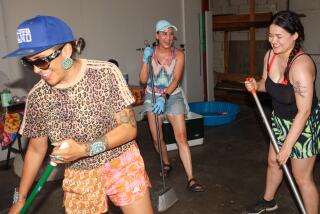The formation of a committee for such a task may not usually be an event of high drama.
In a small, crowded room Saturday, the Friends of the Echo Park Library appointed a committee to find the right spot for a branch library.
Its mission is to lift the branch out of the cramped, poorly located and ill-designed temporary home that it was dropped into 15 years ago when its original building was damaged in the 1971 earthquake.
Formation of a committee for such a task may not usually be an event of high drama.
But this one took some doing, as it was clear to all in the room that the committee would be heading through some flak.
That’s because the Friends already know where they want the new branch to be and library officials have already ruled their choice a poor one.
The site in question is old Fire Station 6, put into semi-retirement a couple of years ago by the Fire Department when a new station was built on Virgil Avenue.
The fire station has great appeal to the community because, aside from Echo Park Lake itself, it is one of the few public amenities that has some grace and is thought of as binding, rather than dividing, the community.
The 1920s structure stands prominently on a lazy curve of Edgeware Road near major bus routes and on one of the few streets that crosses the freeway. There is still vivid resentment among Echo Park’s old-timers over bisection of the community by the freeway.
Against those largely intangible qualities, the downtown library staff sees several fatal deficiencies.
They think that the fire station is too small, too old and in the wrong place.
There are counter-arguments ad infinitum.
The Friends say the building could be expanded from the rear onto three empty lots and still cost less than a new building. The librarians contend that the lots belong to a church that wants to build on them. The Friends say the church could be persuaded to sell.
The librarians say the new branch should be on a business street so it will get more use.
The Friends say it will get more use if it has free parking nearby.
And so on.
And that brings up the committee. The Friends invited the community to join in the search. Sixteen people showed up Saturday, counting two library officials and four of the Friends.
Adding spark to the moment, library officials had hinted that if the debate becomes protracted, the $5 million allotted to the branch replacement from a recent bond issue could be lost or diminished.
The warning was interpreted as a threat.
“Do you get the feeling there is never going to be a library?” asked Sue Nelson, a former Westsider who helped prod Washington into creating a national park in the Santa Monica Mountains before moving to the old suburb north of downtown.
“I’ve been through this,” Nelson said. “Anything that bides time in order to let anybody who makes the final decision make it. It makes it look as if the community is participating, when it is actually just running around.”
Regional Librarian Sonja Williams tried to ease her apprehension with a simile. She suggested that they think of the money as being in a pot.
“Down the line, some of these things occur now, some later,” she said.
“Some are seven, 10 years down the line. You may wind up using that pot at a greater rate. It may cost more to complete the project than what it was originally set to cost.”
Her simplification was not appreciated.
“So what if your strategy is to destroy this site and not use it?” Nelson snapped. “What if you calculate that?”
“I think that’s paranoid,” said Sylvia Galan, the Echo Park librarian, who up to that moment had tried to take no side.
“It’s real,” Nelson said.
Another woman moved from Nelson’s Machiavellian insight to a simple proposition:
“Why can’t the library say, ‘OK, you want it here? Here’s the money, you build your library?’ ” asked longtime resident Sophia Lewis.
“We’re talking about building a 12,500-square-foot new building as opposed to going to an old building that has 4,000 square feet,” Williams said with growing frustration.
“But what if we can’t find the land?” Lewis asked.
“We haven’t even tried,” Williams said.
“Oh, yes we have,” several voices said at once.
“It’s a stall,” Nelson concluded.
“Well, I think we should look a little,” Lewis at last conceded. “Look some, and that’s it.”
“Two months,” Nelson said.
Ginger Mayerson, president of the Friends, asked a soft-spoken man named Craig Weingarten, who seemed familiar with the community’s bus lines, to head the committee.
He accepted but offered his own doubt that the job could be done under a ground rule prohibiting the use of eminent domain.
That thought unleashed a new outpouring of Angst about developers, who are perceived as snapping up all the land in Echo Park.
Later, one of the Friends summed up the day:
“They thought the Friends group was difficult to deal with,” Karen Jaeger said. “Now they’ve seen Echo Park in the raw.”
More to Read
Sign up for Essential California
The most important California stories and recommendations in your inbox every morning.
You may occasionally receive promotional content from the Los Angeles Times.










